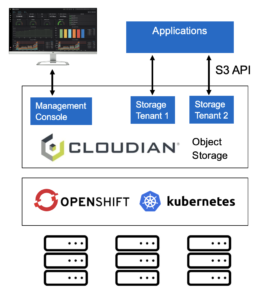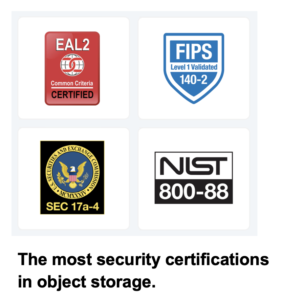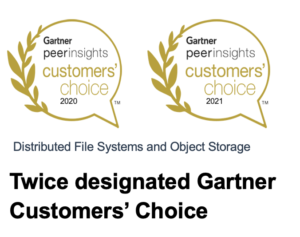

Jon Toor, CMO, Cloudian
Cloudian just announced storage support for RedHat OpenShift. Now, our software-defined, S3-compatible object storage can run in a container on the OpenShift platform alongside production Kubernetes applications. Any containers workload that requires persistent storage – whether for dev ops or production – can access its own workspace in a Cloudian scale-out cluster.
Cloud-Like Storage for OpenShift On-Prem
Object storage is the ideal storage for OpenShift because of its cloud-like attributes: a high-level S3 API, limitless scale, built-in data protection, and geo-distribution.
Cloudian is enterprise-class software-defined-storage that provides the scalability and simplicity of public cloud, but in your data center and fully under your control. And now Cloudian software runs in a container and can be orchestrated by OpenShift.
It provides self-serve storage for OpenShift developers, while also providing a highly-secure platform to support operations.
Here are seven requirements our customers identified for containers-ready storage, any why Cloudian offers a compelling option:
S3 API Compatibility
S3 API compatibility is a good starting point for a modern storage foundation for two reasons. First, the S3 API fully abstracts the storage hardware, so users can consume storage without having to manage it. Second, using the S3 API helps ensure portability: applications on-prem and in the cloud can employ the same storage commands. Cloudian offers the industry’s highest S3 compatibility and is the only enterprise-class storage platform designed from the ground up for the S3 API.
Simple Scalability
 Users accustomed to the cloud storage now expect a cloud-like management experience on-prem for OpenShift storage. Easy scalability is certainly part of that. But scalability has dimensions that go beyond maximum capacity. Here are some other requirements to bear in mind.
Users accustomed to the cloud storage now expect a cloud-like management experience on-prem for OpenShift storage. Easy scalability is certainly part of that. But scalability has dimensions that go beyond maximum capacity. Here are some other requirements to bear in mind.
- Multi-tenancy: The system must securely share capacity from a single storage pool among multiple workloads and user groups.
- Linear performance growth: To eliminate bottlenecks, the performance must grow as the system grows. This requires parallel processing in which any node can respond to any request. Cloudian is a fully peer-peer architecture, meaning that all nodes can process requests simultaneously.
- Modular growth: The platform must be able to start small and grow easily, without limit and without interruption. Cloudian is a single software image that can run in a container, a VM, or a bare metal server. Expansion is only a matter of adding nodes.
Cloudian is proven in thousands of large-scale production deployments. Cloudian has deployments that span dozens of sites, approaching 100 nodes in a single cluster. Some competitive solutions are proven only to a few nodes, and are primarily used in dev ops.
Multi-platform support
A cloud-like storage environment needs the flexibility to run on any platform, including containers, VMs, bare metal or even in the cloud. And there should be no requirement that all nodes be identical. With this, you can deploy storage nodes when and where they are needed. Cloudian is a single software image that can be launched wherever needed, so it’s easy to deploy and maintain.
Performance
Modern storage platforms must deliver high-level, predictable and scalable performance. Cloudian delivers this with:
- All-flash options: Cloudian is flash-compatible software. Pre-configured, fully-supported all-flash appliances are also available from Cloudian.
- Fast search: Finding data quickly can be as critical as accessing it quickly. Which is why Cloudian maintains multiple copies of all metadata, one copy in each node. Competitive solutions combine metadata with user data, which means every search request must go to every node. This makes searches very, very slow. Also, Cloudian stores all metadata on flash memory (even on HDD-based systems), further accelerating search
- Durability: Cloud-native storage needs to be durable and protected against data loss. It should be highly available, meaning that equipment failure will not interrupt access. To accomplish this, object storage often employs erasure coding, a technology that stripes data across multiple devices such that all data can be retrieved even if a device is offline. Cloudian has configurable erasure coding, and unlike competitors, also enables erasure coding across multiple physical sites. This protects you from site failure without requiring costly data replication.
Ransomware Protection the Highest Security Available of any Object Storage
 Modern storage platforms should provide protection from ransomware and other forms of hacker attack. For ransomware protection, Cloudian offers S3 Object Lock for immutable storage and encryption for data in flight and at rest. Also included is the industry’s richest set of security features, including integrated firewall, RBAC/IAM and SAML access controls, and certification with stringent government security requirements such as Common Criteria, Federal Information Processing Standard (FIPS) and SEC Rule 17a-4(f). No object storage is more secure.
Modern storage platforms should provide protection from ransomware and other forms of hacker attack. For ransomware protection, Cloudian offers S3 Object Lock for immutable storage and encryption for data in flight and at rest. Also included is the industry’s richest set of security features, including integrated firewall, RBAC/IAM and SAML access controls, and certification with stringent government security requirements such as Common Criteria, Federal Information Processing Standard (FIPS) and SEC Rule 17a-4(f). No object storage is more secure.
Geo-distribution
Cloud-native apps are portable and easily distributed across many locations. As a result, it’s critical that storage systems can also be distributed without creating hard-to-manage storage silos. Cloudian nodes form a cluster that can span multiple locations yet can be managed as a single storage environment.
Proven in Large-Scale Deployments Worldwide
 Twice designated a Gartner customer choice (read the reviews here), Cloudian is the world’s most widely deployed independent object storage with nearly two exabytes deployed worldwide at Global 2000 firms, government, healthcare firms, financial service providers and more. Cloudian has sales and support teams around the globe in North America, EMEA, and APJ ready to answer questions and provide technical guidance. To experience Cloudian for yourself, click here for a full-featured free trial.
Twice designated a Gartner customer choice (read the reviews here), Cloudian is the world’s most widely deployed independent object storage with nearly two exabytes deployed worldwide at Global 2000 firms, government, healthcare firms, financial service providers and more. Cloudian has sales and support teams around the globe in North America, EMEA, and APJ ready to answer questions and provide technical guidance. To experience Cloudian for yourself, click here for a full-featured free trial.
To learn about Cloudian storage for modern applications, go to Storage for Kubernetes | Cloudian.


